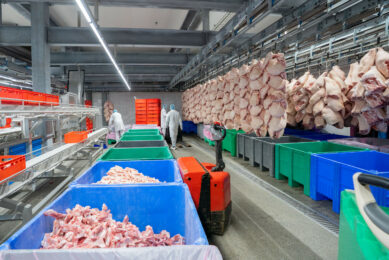Chile’s meat sector: deal for antibiotics usage

Chile’s Agriculture and Livestock Service (SAG) has signed a collaboration agreement with ChileCarne (Association of Meat Exporters) and Meat Corporation, 2 representative entities in the country, in order to promote a joint effort to reduce antibiotics at producer level.
The voluntary commitment was sealed in a virtual ceremony in December, to involve the private sector into proper usage of drugs, under the SAG coordination. The goal is to avoid the increase of antimicrobial resistance.
The event was headed by the national director of SAG, Horacio Bórquez, with the presence of the president of ChileCarne, Juan Carlos Domínguez, and the president of the Meat Corporation, Sergio Willer.
Responsible use of antimicrobials
Mr Bórquez said, “Our efforts aim to respond effectively to the call of global organisations such as the World Organization for Animal Health (OIE), the World Health Organization (WHO) and UN’s Food and Agriculture Organization (FAO) regarding responsible use of antimicrobials.”
He said the topic is key in order to safeguard human and animal health in the future. Chile is the only country in Latin America that has prohibited growth promoters (since 2018). Antibiotics are allowed for therapeutic usage under veterinarian prescription.
Domínguez said, “Caring for animal health through proper use of antibiotics has always been a priority. The joint work with our authorities has allowed us to continue developing our industry in accordance with the new requirements regarding human health care.”
Increasing animal production, welfare and sustainability
For the president of the Meat Corporation, Sergio Willer, the agreement will integrate Chilean livestock production-commercial chain and increase animal production, animal welfare and sustainability. He said, “It a milestone for appreciation from consumers of safe products, both in Chile and in export markets. This action is consistent with the objective of allowing adequate economic and productive development of the properties, without neglecting our role in relation to sustainability.”

More on the theme of antibiotic reduction in our recently published special edition on Gut Health
According to SAG, the agreement also expresses expectations about Europe, which is likely to soon require third countries to follow the regulations related to antimicrobials at the same level its own.
The agreement stated: “National associations will begin to adapt to upcoming requirements of the world’s most demanding destination markets in order to keep their negotiating power.”
Exports to China, Japan and South Korea
In 2019, pork represented 35% of the total meat produced in Chile with 530,000 tonnes (70% for exports). Exports increased 11% in tonnes and 18% in value last year. China (42%), Japan (21%) and South Korea (18%) were the main destination markets in value.











